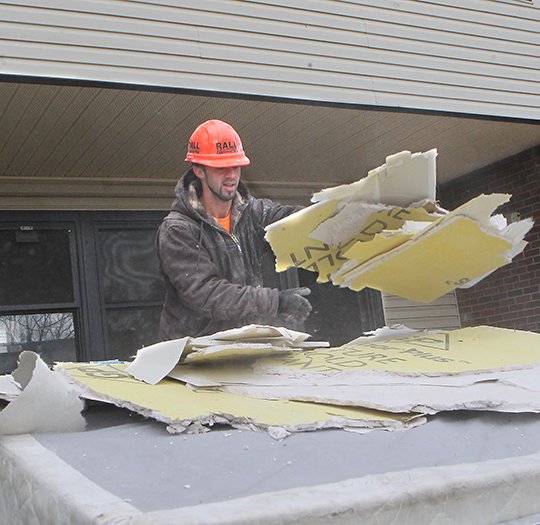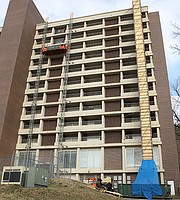City leaders breathed a collective sigh of relief after last year's sweeping tax bill preserved the Federal Historic Rehabilitation Tax Incentives program, but the continuation of another tax incentive may still prove more critical for property development.
The Historic Tax Credit and Low-Income Housing Tax Credit were both eliminated from the House version of what became the Tax Cuts and Jobs Act of 2017. While the historic credits incentivize the rehabilitation of buildings considered essential to the character of a city, the housing credits encourage investment in affordable rental housing.
The latter is a key piece in the creative financing that is restoring the Hot Springs Housing Authority's 365 units, transferring them from public housing to privately owned, rent-controlled units under Section 8 of the Housing Act of 1937.
It's part of the U.S. Department of Housing and Urban Development's Rental Assistance Demonstration, a pilot project Congress created in 2012 that uses the private sector to fund the capital needs of public-housing developments.
Work on the 11-story Mountain View Heights senior tower and Eastwood Heights family units is underway. Housing Authority Executive Director Richard Herrington said the $57 million project was contingent on the survival of the tax credit, which made it into the final version of the tax bill.
Both credits are enshrined in the tax code, but the lowering of the corporate tax rate from 35 percent to 21 percent makes them less attractive to investors. The lower rate reduces tax liability, making credits that offset that liability less valuable.
"Everybody is talking about the Historic Tax Credit," Herrington said. "Ours actually produce housing, where the Historic Tax Credits don't necessarily. They're more for business opportunities. We don't say ours are more important, but having a place for a person to stay is important."
Herrington said the deal closed Dec. 28, with Royal Bank of Canada providing more than $17 million in equity through the 4-percent credits it marketed on behalf of the Bennett Group, the Alabama-based development company leading the project.
Herrington said no capital improvements have been made to the city's public housing since it opened in the 1960s, leading to more than $18 million in deferred maintenance.
"Previous management really did nothing to keep this place up to snuff," he said. "I've heard all kinds of stories from staff members who are still here about what the previous management didn't do to maintain this property. The only way we were going to get an infusion of cash was to do this.
"It was either do this, or we would still be doing what we've always done. You do a piece here. You do a piece there, but you never really get anything taken care of."
Herrington said revamped public housing encourages investment in other properties.
"It's going to force some people to take care of their own units, because they don't want to be the odd ball out," he said. "Landlords who own property between us and downtown, it's going to force them to do something. That happens in a lot of cities. A Housing Authority starts to build, to rehab, it changes the whole makeup."
The Arkansas Development Finance Authority allocated the tax credits, which are distributed to states based on population, to the Bennett Group. RBC sold the credits to investors seeking to reduce their income tax liability. The Bennett Group said the bank received $397,528 to sell the credits, which are claimed over a 10-year period.
The investors own the majority stake in the Mountain View Heights LP, the entity that will own the Housing Authority's land and buildings once the title is transferred. They are passive partners, with the Bennett Group and the Housing Authority serving as minority partners overseeing the project and management of the property during the 15-year life of the partnership.
The partnership purchased the property for $17.8 million, with the Housing Authority carrying the note rather than a third party financing the acquisition.
Herrington said Allied Orion Group of Houston is now managing the properties. Their expertise in tax credit property management was sought out by RBC, Herrington said, as the tax credits can be rescinded if the property falls out of compliance with the requirements of the credits. Ensuring a percentage of the units are made available at below market rent, or for renters earning a fraction of the area's median income, is one of the mandates.
It will remain in place during the 15-year life of the partnership and for an extended use period of at least another 15 years.
"This is one of the things the investor wanted," Herrington said. "They made an arrangement with Allied Orion to manage the property for three years with our people. In three years we will resume management of the property.
"You need someone who knows what they're doing on the tax credit side to handle this. We don't have experience on tax credits, so they'll train our staff."
Private activity bonds the Arkansas Development Finance Authority issued as part of the financing package also made it into the final tax legislation after being cut from the House version. Citibank purchased the approximately $30 million issue, which will ultimately be sold to the Federal Home Loan Mortgage Corp.
Income-based rent payments made by tenants and HUD project-based vouchers will secure the debt and maintain the properties, Herrington said. In addition to the $28 million in construction and $17.8 million in property acquisition costs, the partnership is also responsible for numerous soft costs such as engineering, architect, legal, lending, accounting and developer fees, a needs assessment and market and environmental studies.
"Between what the government pays residents and the rent residents pay, they should be able to turn over enough money to make this work," Herrington said.
Spring 2019 is the projected completion date, he said. About one-third of the units are currently vacant. Residents will be relocated to empty units during the phased construction.
Local on 02/10/2018

